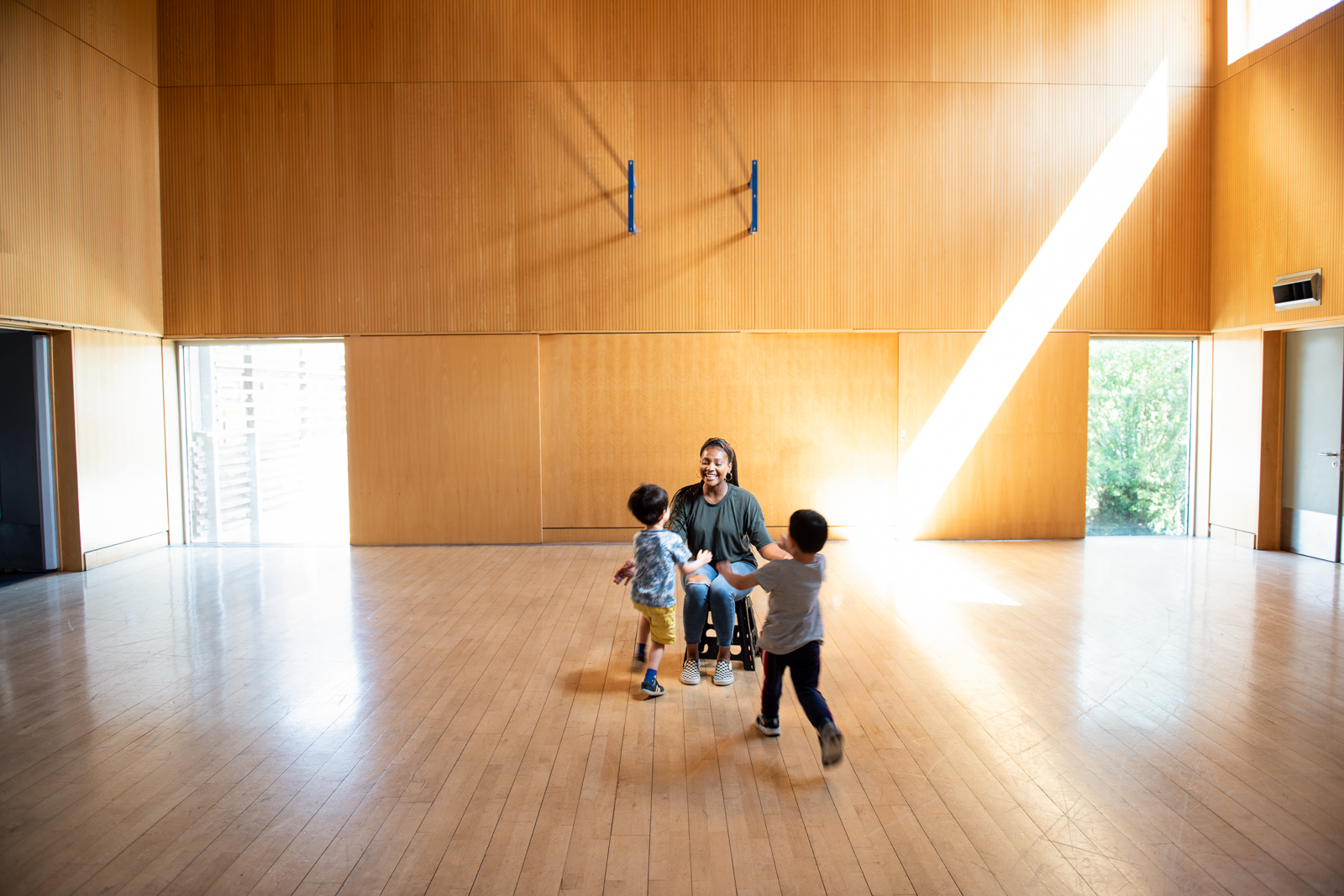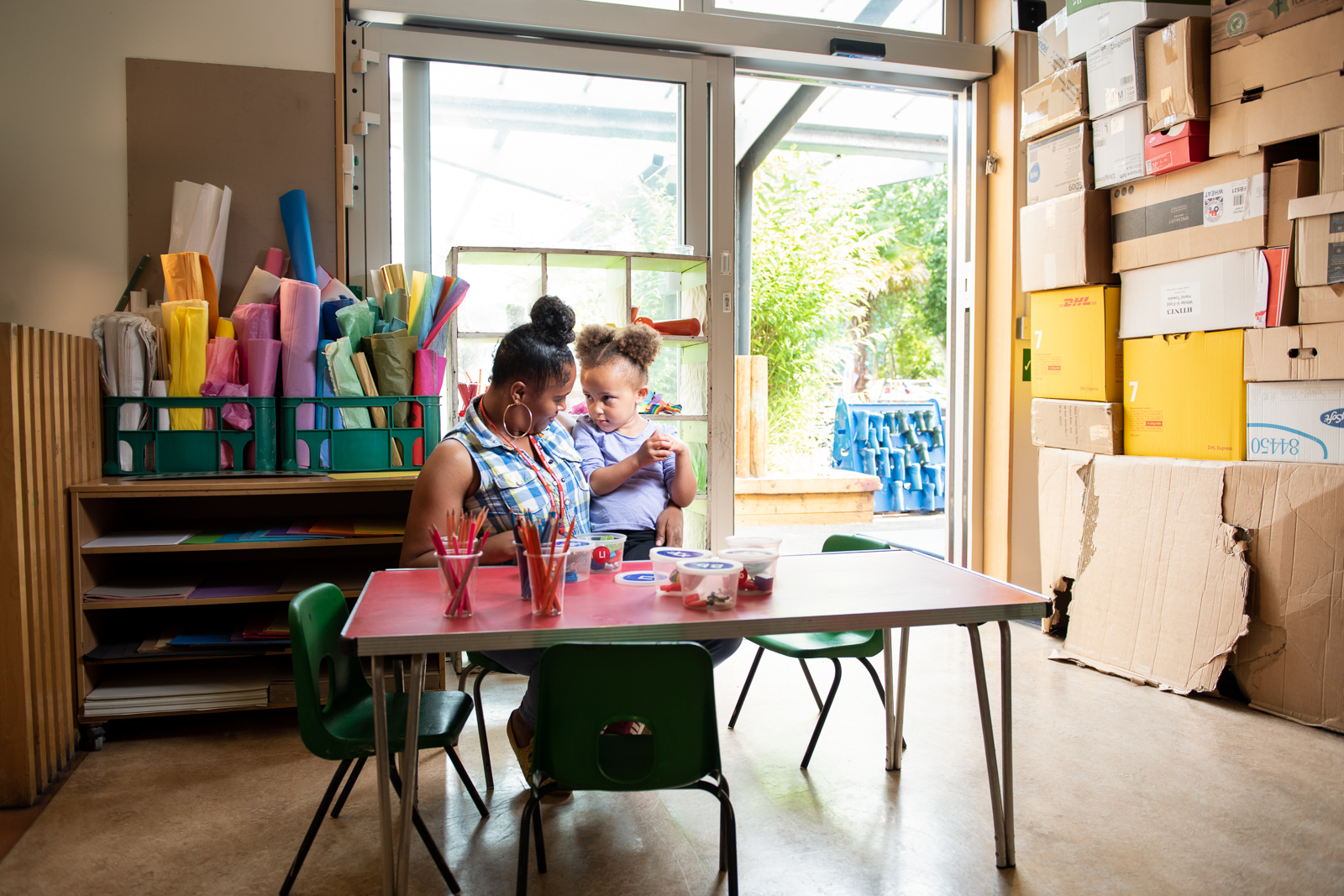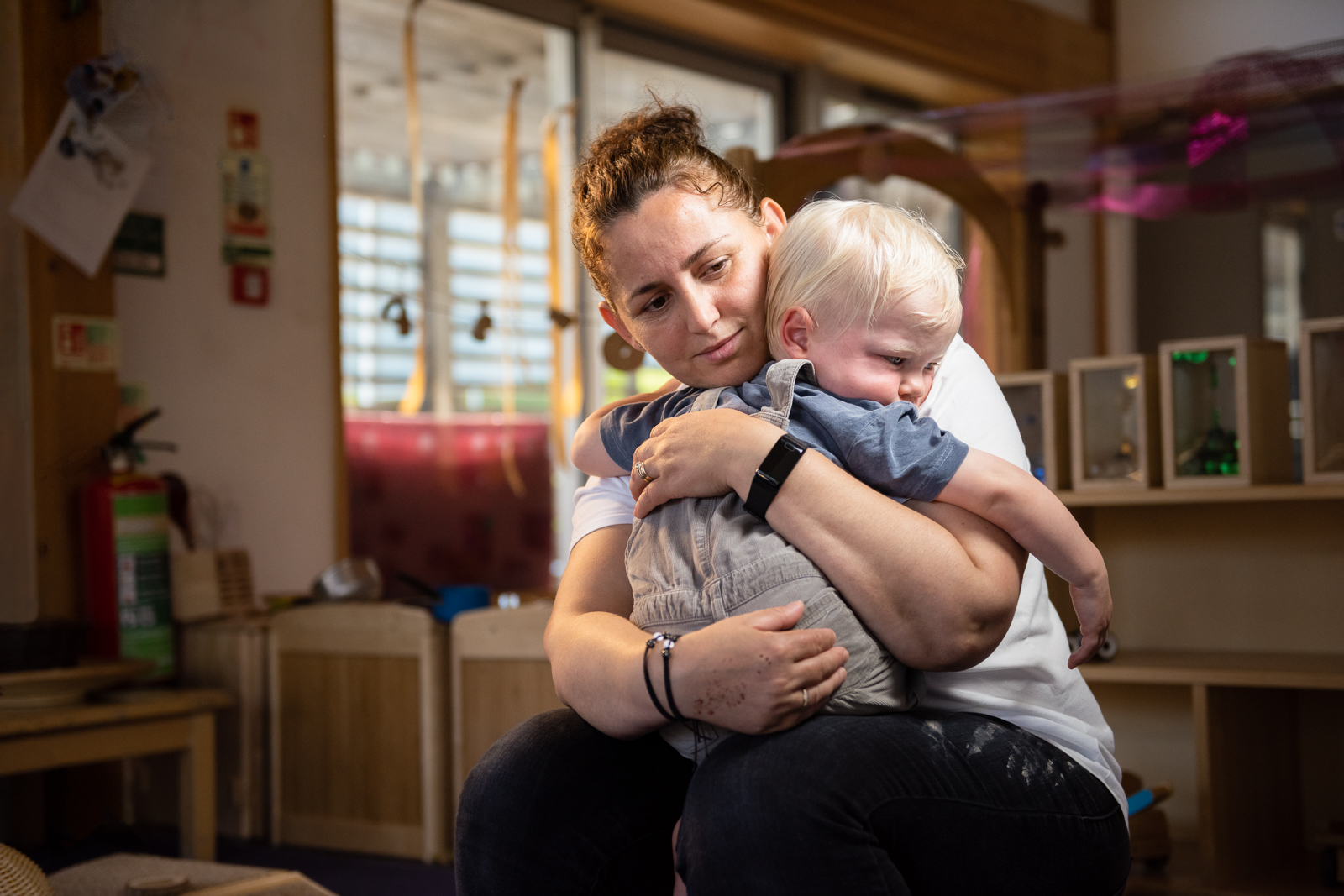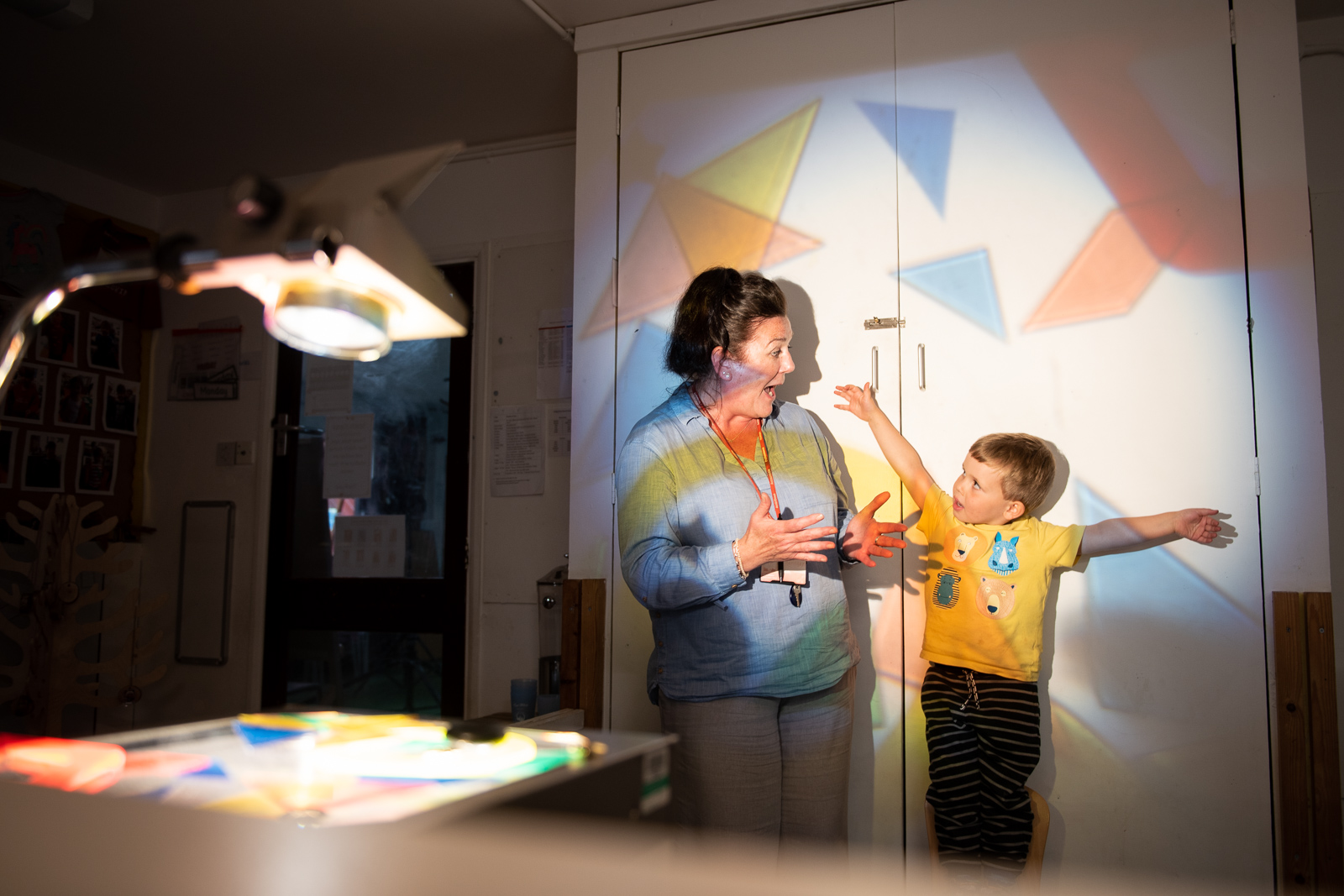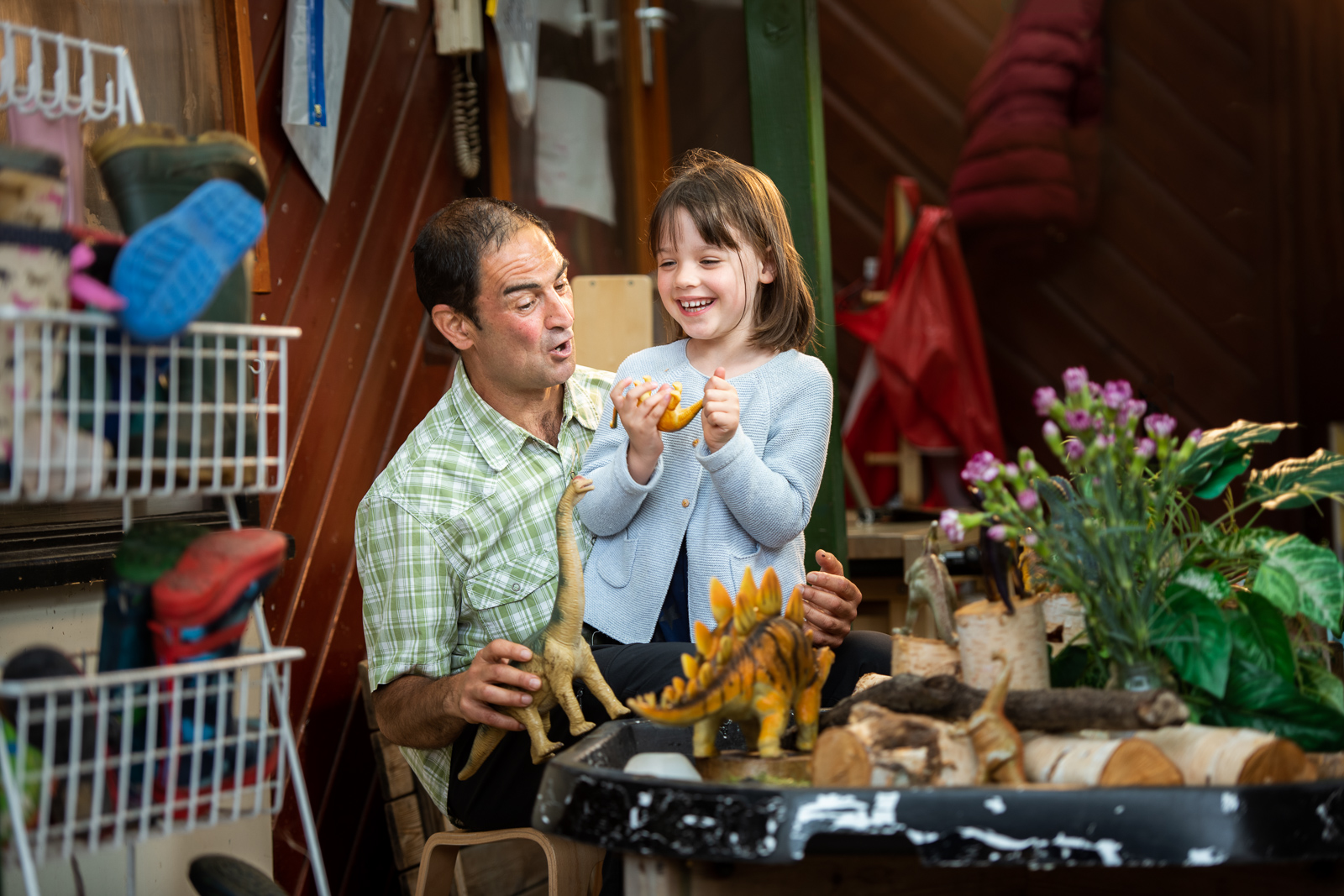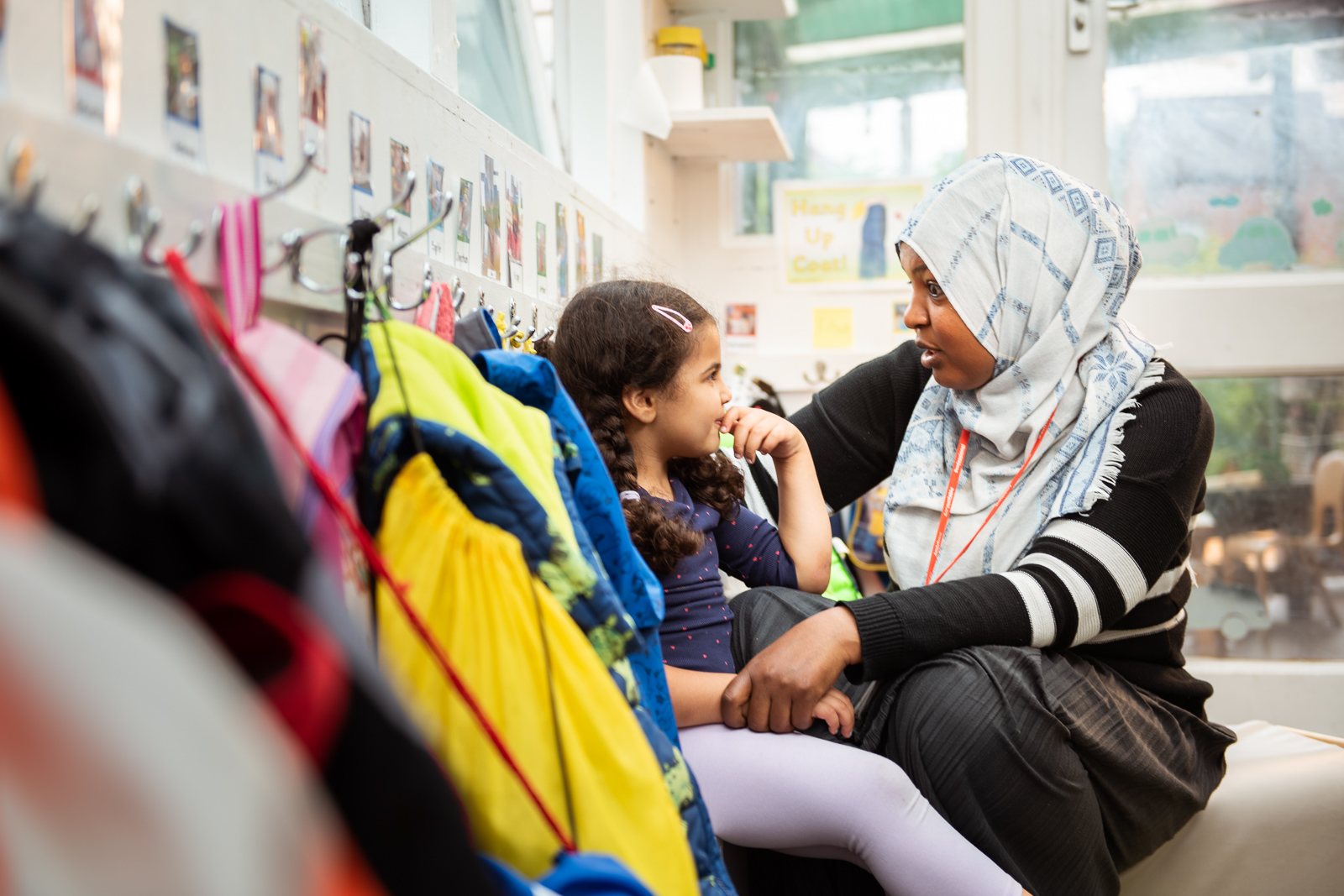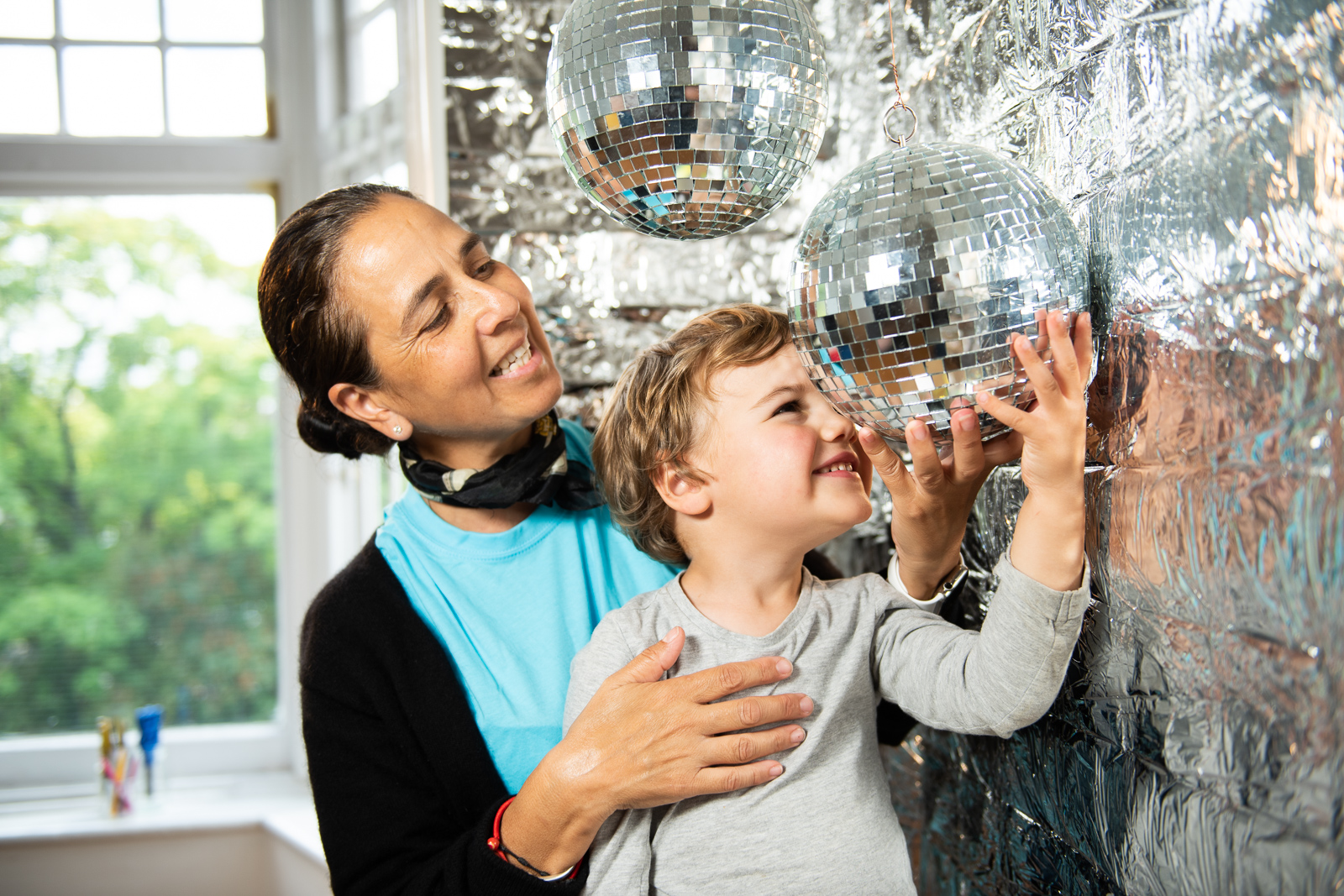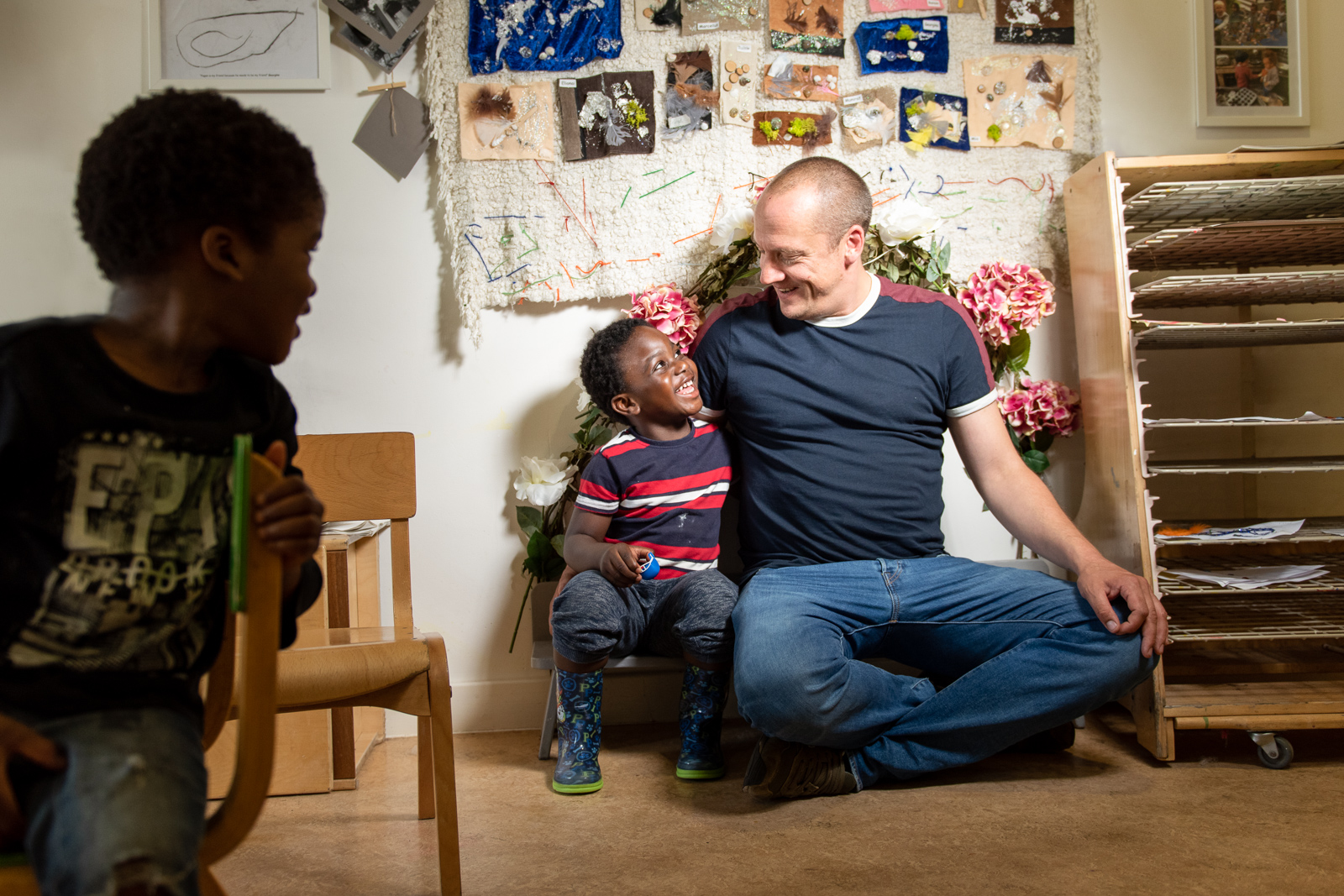and featured as a Guardian Photo Essay
During lockdown,
Tanisha
I’ll be honest, at first, it was quite frightening. I’m sure we’d all like to stay at home and keep safe, but that’s just not the way the whole world works. I’d imagine the parents that have to go to work too, and how they feel leaving their children. It’s so important for their day at work, that they know that their children are safe and happy at nursery. I’m a mum, and I’m a key worker, and that for me, would mean everything.
I imagine that they’re going to work every day frightened – will they get ill, what’ll happen to their child, how are they going to keep the roof over their heads? And so all I could do is come into work myself, and put my best foot forward, thinking if we can make their children’s life a little bit better, it’ll make their day a lot better too. At least they know that their child is safe. And so I just thought, come on, you know, my son’s safe, he’s out of harm’s way. And as long as I keep myself well, I can keep on doing what we’re supposed to be doing.
But I also wanted to show my son a good role model: that through tough times, through uncertain times, that I can still get up and be positive, and also bring a little bit of positivity to the children here in the nursery too, because they don’t really understand what’s going on. It’s quite frightening for them – the world’s changed all of a sudden in their eyes. So I just thought, I’m a mum, come here to the nursery and let the children’s parents know that they’re in safe hands – that was my everyday get up and go thought.
Mira
The age group that I work with are too small to understand anything to do with covid. Some of them don’t even speak yet. And when a baby cries, you can’t just leave them crying over there with you watching – they’re babies, we can’t do that! Even with the older children, when they come for a hug, you can’t just tell them to keep a distance.
It was weird in the beginning because, despite what I said about hugging the children, those children are coming from outside and we don’t know where they have been or whether they’ve had contact with anyone else, and so of course it was worrying to be at work and then go home and see my family, my two children and my husband, after that.
But I can’t just tell a child to stay away from me. I can’t do that. They’re too small, they don’t understand that and they aren’t gonna get it.
In the class room, we’ve had to remove everything like rugs, soft toys, blankets, lego, books – everything. And the toys which we have kept on our floor, we have to spray them every single day to wash them and make them ready for the next day. So we make sure we spray everything, which is a lot more work, and you have to do it every day for them because they do touch it, in fact everybody touches it, or maybe they put in their mouths. So I make sure it’s nice and clean for them as well. They need it done for them.
Tina
These children’s parents are working on covid wards, they’re GPs having to do emergency appointments, they’re seeing people face to face, and when they’ve finished their shift, they’re coming to us. We open that gate – and what do they want to see? A child with a smiley face, that’s really tired and has had a really great day. The kids pick up on the slightest thing, so if you’re stressed, you’ve got to turn it on. You want their journey through covid to be as positive and happy as it could be.
I do think that there’s some people, including myself at times, who have been in quite a fragile state of mind. I’m exhausted more so than I ever have been, because you’re using your nervous energy. You’ve got worries as well so you don’t sleep as well as sometimes.
When I get back home, I’m exhausted. I use the buses, as I don’t drive. And then it’s wash your hands, take your clothes off, have a shower – and make sure and I’m wiping down everything in my home too, so it’s not just your shift here. But you do feel a sense of achievement, and I do feel that you need to have that, in order for to go home, rest, eat some nice food, have a glass of wine and then come back the next day.
Gabriele
This is the foundational stage for the child, one where they start to develop and if they miss something, there can be under development. It’s important that they create a bond with people, with significant others, and with the people next to them. And if you are distant, you cannot create this bond. Instead you will disconnect with the child.
Children like to play, and if I say to them ‘no, no, don’t come to me’, the child can look at me confused and ask ‘why don’t you want me? Yesterday you were playing with me, but today you won’t play with me?’. It’s very important for them to have continuous care and continuing provision, both educationally and emotionally, and if you’re far away from them, you lose this connection.
A child might start to cry, become very quiet or withdraw. If this happens, at this age, it could have a detrimental effect on the child, educationally and emotionally. But I think in my personal opinion, the effect is more emotional because at this stage, the child needs this emotional support, and this attachment, to develop a better foundation.
Biftu
At first the pandemic was scary, but we have to face it. I think that if it’s meant to be, it’s meant to be. You can’t lock the door and stay away from it. And if you accept it, it’s not difficult. Then you don’t feel like you’re scared or vulnerable.
The first two weeks I didn’t go out as I was off from work. And then, when I did go out, my eyes were hurting from the sun as it was so bright – and so from that day, I said I’m not going to stay inside all the time because it’s not good: not for your brain, for your body, or for everything else.
Some children here are coming from other nurseries, and that transition for them is very difficult. You need to make them both come and be happy here, all at the same time. It’s easy to put pressure on yourself, but when you do, the children get pressure as well. So first, the adults have to become calm, to get nice and smooth, and then the children will be too.
Without contact, it’s no good for them. It’s no good because children, when they play, they talk and move, and their brain and emotions develop. When they communicate with friends, they pick up speech. When they move, they become strong. So we just have to be calm, and then do as normal.
Louisa
I’ve been at this nursery for 30 years and in that time, I would say this is the biggest challenge I’ve had to face, because it’s unlike anything we’ve ever known before. Friday was the announcement you’re going to close, and Monday we were back open just for vulnerable children and the children of key workers, all from different places. Myself and Fiona, the Deputy Manager, have worked really closely with Nick from Haringey Council, and that’s been really instrumental in terms of advice and support.
So the phone started ringing and the referrals started to come in. I think the challenges were how do these children adjust to new environments? What could we do to make sure that they had a good transition, reassure parents from home, and send out messages and activities to them? We were really, really busy with a small skeleton team.
I don’t think we have come up for air yet. Every day brings a different challenge – you come in and something’s changed, for example more calls for places for children whose families are key workers.
We were offering places to 130 families in Haringey, and now we’re accommodating 77 families, which is a lot of children in this environment. We’re working at a high percentage. But there are families staying at home, who are not now having that face to face contact, and are not having their issues resolved quickly. Like before, a parent would come up and say, ‘can I speak to you for a minute?’ and I would always make time. I’d have a little conversation, share a few techniques, and within two or three weeks, that stress is over – but now it’s very different, which is a worry.
In general, looking at the national picture, I’m very worried and not just educationally. By only staying home, children’s socialising and well being is compromised.
Phil
Kids require contact because they need the reassurance that that bings. You’ve got to understand that these are very young children, and they’re still very vulnerable. They need to feel like they’re in a secure and safe environment, and so you have to show them that kind of love. It’s just not possible to stand two metres away from them, wearing a face mask and gloves. Your face is one of the primary ways in which you communicate with a young child, especially as a lot of time their language isn’t there yet.
If we’re treating the children differently from how we did before this whole situation – if we were not giving them cuddles, if we were not being attentive to their needs, if we were not in close proximity with them – they will pick up on that, and then we’ve got a bigger problem because the children won’t feel safe and secure.
To be honest, it didn’t really bother me being in close proximity with others while everyone else in the country wasn’t, because I know what this job entails. To do it properly, you need to have that tactile environment, and so there’s no point in saying I’m not going to do X, Y and Z. You’ve just got to get on with it.
We’re not doing anything different now – we’re still doing what we were doing in January, in November, and last summer – and that is to provide children with a really stimulating, loving and caring environment in which they can flourish. It’s as necessary for a child, as sunshine and water is for a plant.
Britney
We are much more thorough with the cleaning. Previously we’d clean the toys, tables, door handles and surfaces probably twice a day, but now it’s every 30 minutes. That’s a major, major difference, and it’s taking up much more of our time.
Another is splitting the rooms. So for example, the toddler room now has no more than 10 children, though before it was more like 20. And it’s going to be an ongoing challenge because we’ll need a lot more staff to be in different areas. And even a lot more rooms.
I think everyone needs to understand that with children it’s not possible to social distance. They don’t understand, and you can’t just tell them, don’t hug your friend or don’t go near your friend – that would just create an atmosphere that’s really negative for the children. On the one hand, you’re aiming for everything to be as normal as possible, but at the same time, we have a duty to ensure that the environment is safe and that we’re following the guidelines that are set out by the government, though much of that is confused. The management where I work are trying their best with the information that they’re being given by the government, but so much of that doesn’t seem to take into consideration that every centre is different, and that they can’t all just adapt and do all of these things that they’re telling us to do. It’s just not possible. For this reason, I think that the way we’re currently working is just not sustainable.
Before we had a much closer type of communication with the parents. They could actually come into the centre’s classroom and directly drop their children into the room, and see them go off and play with their friends, whereas now, we just straightaway take them from their parents and take them into the room ourselves. And at pick up we have to take the child to the entrance to meet their parents, and if you’re trying to give feedback to say five parents, it’s a little bit awkward and rushed, and so the parents might feel like they’re not really as involved in the centre as they were before. They don’t actually know what’s going on behind closed doors, and they don’t see the beneficial changes that we’ve made.
Because of the fear and anxiety of parents, some of the children might not come back to school. It is a worry for me, especially as a practitioner, knowing that some children are going to be left without an education – especially those children who are vulnerable and who need more of a push than other children. To accept that as a reality, is quite disheartening, and sad to say.


